EMSK5012 Employability Skills: Summer 2018 Journal on Career Theories
VerifiedAdded on 2024/07/12
|8
|1331
|454
Journal and Reflective Writing
AI Summary
This journal assignment focuses on employability skills, exploring self-reflection and the application of career development theories. The author reflects on Gallup's Strengths theory, identifying personal strengths like knowledge-based skills, transferable skills, and personal traits, and how these can be applied to achieve career aspirations. The assignment also critically appraises the vocational choice theory and Maslow's Hierarchy of Needs, discussing their flaws and potential applications. The journal concludes with reflections on how these theories can be applied to future career development, emphasizing personal ownership and cultural transferability to enhance customer satisfaction and career choices.
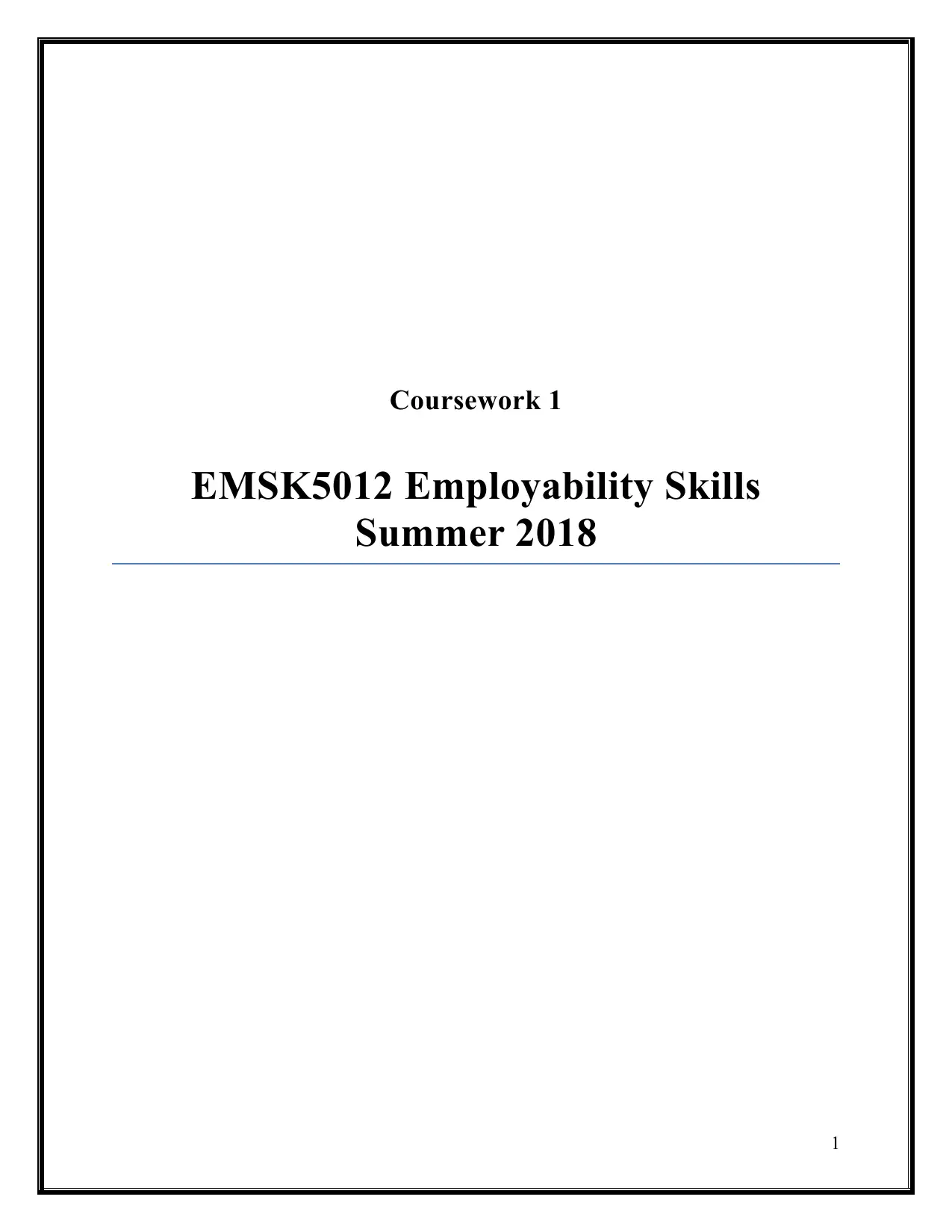
Coursework 1
EMSK5012 Employability Skills
Summer 2018
1
EMSK5012 Employability Skills
Summer 2018
1
Paraphrase This Document
Need a fresh take? Get an instant paraphrase of this document with our AI Paraphraser
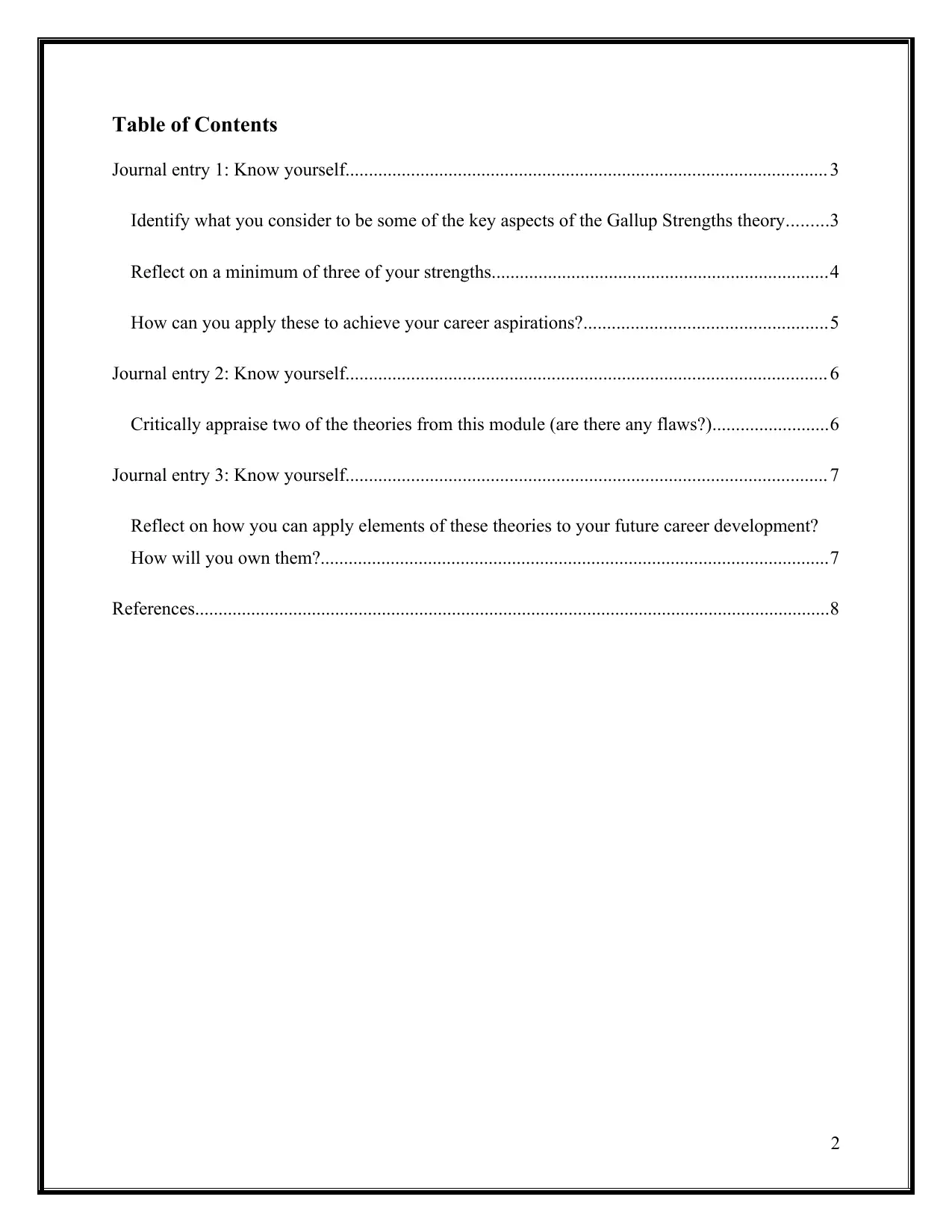
Table of Contents
Journal entry 1: Know yourself....................................................................................................... 3
Identify what you consider to be some of the key aspects of the Gallup Strengths theory.........3
Reflect on a minimum of three of your strengths........................................................................4
How can you apply these to achieve your career aspirations?....................................................5
Journal entry 2: Know yourself....................................................................................................... 6
Critically appraise two of the theories from this module (are there any flaws?).........................6
Journal entry 3: Know yourself....................................................................................................... 7
Reflect on how you can apply elements of these theories to your future career development?
How will you own them?.............................................................................................................7
References........................................................................................................................................8
2
Journal entry 1: Know yourself....................................................................................................... 3
Identify what you consider to be some of the key aspects of the Gallup Strengths theory.........3
Reflect on a minimum of three of your strengths........................................................................4
How can you apply these to achieve your career aspirations?....................................................5
Journal entry 2: Know yourself....................................................................................................... 6
Critically appraise two of the theories from this module (are there any flaws?).........................6
Journal entry 3: Know yourself....................................................................................................... 7
Reflect on how you can apply elements of these theories to your future career development?
How will you own them?.............................................................................................................7
References........................................................................................................................................8
2
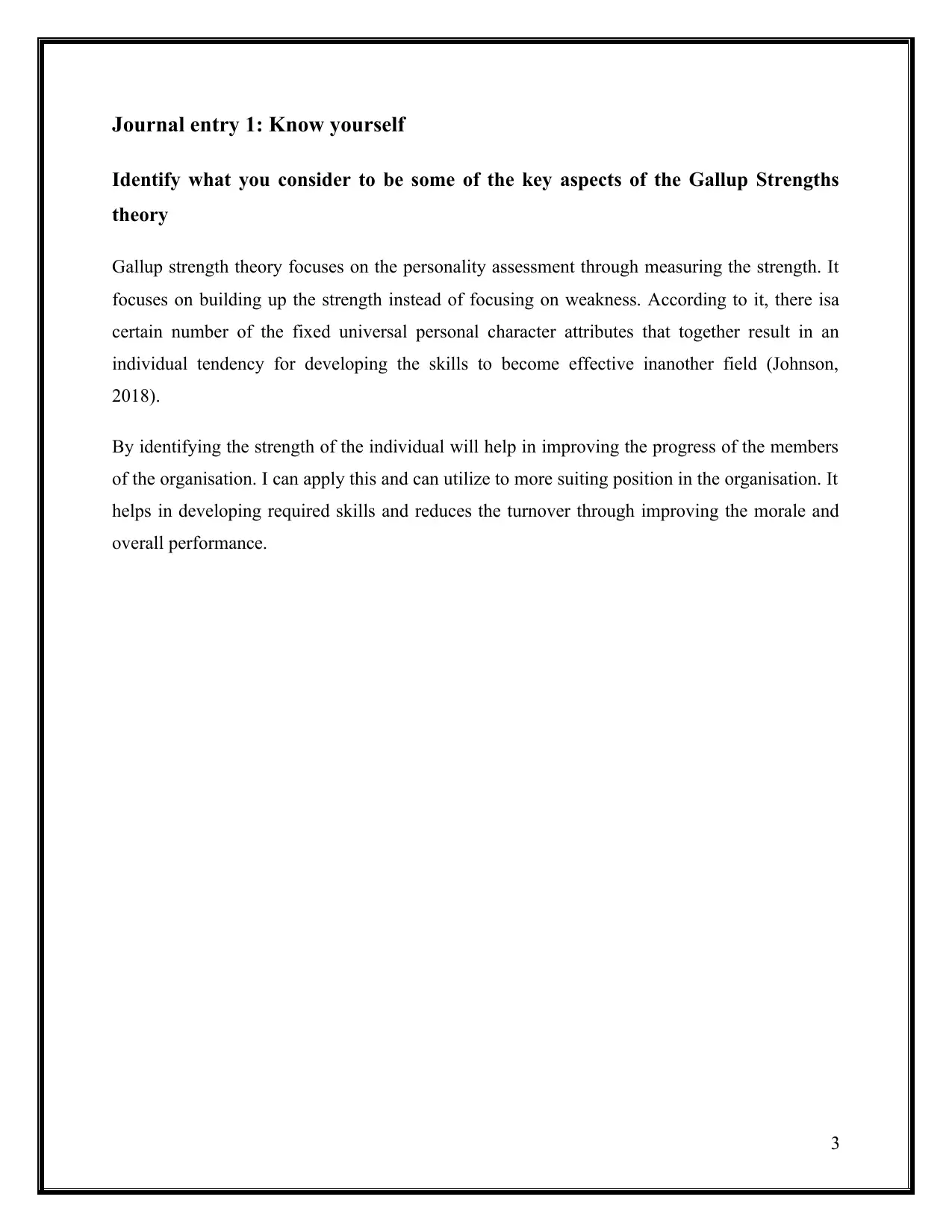
Journal entry 1: Know yourself
Identify what you consider to be some of the key aspects of the Gallup Strengths
theory
Gallup strength theory focuses on the personality assessment through measuring the strength. It
focuses on building up the strength instead of focusing on weakness. According to it, there isa
certain number of the fixed universal personal character attributes that together result in an
individual tendency for developing the skills to become effective inanother field (Johnson,
2018).
By identifying the strength of the individual will help in improving the progress of the members
of the organisation. I can apply this and can utilize to more suiting position in the organisation. It
helps in developing required skills and reduces the turnover through improving the morale and
overall performance.
3
Identify what you consider to be some of the key aspects of the Gallup Strengths
theory
Gallup strength theory focuses on the personality assessment through measuring the strength. It
focuses on building up the strength instead of focusing on weakness. According to it, there isa
certain number of the fixed universal personal character attributes that together result in an
individual tendency for developing the skills to become effective inanother field (Johnson,
2018).
By identifying the strength of the individual will help in improving the progress of the members
of the organisation. I can apply this and can utilize to more suiting position in the organisation. It
helps in developing required skills and reduces the turnover through improving the morale and
overall performance.
3
⊘ This is a preview!⊘
Do you want full access?
Subscribe today to unlock all pages.

Trusted by 1+ million students worldwide
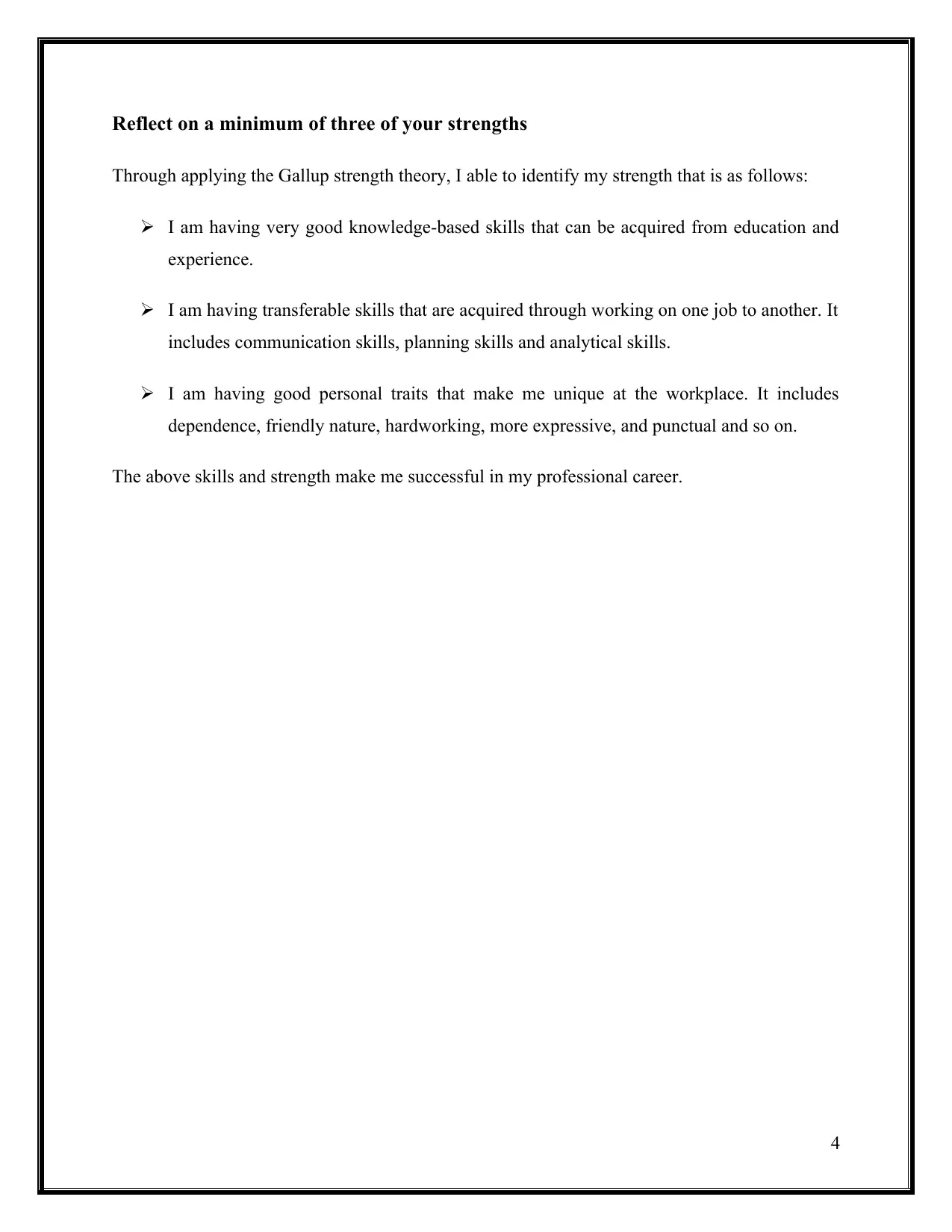
Reflect on a minimum of three of your strengths
Through applying the Gallup strength theory, I able to identify my strength that is as follows:
I am having very good knowledge-based skills that can be acquired from education and
experience.
I am having transferable skills that are acquired through working on one job to another. It
includes communication skills, planning skills and analytical skills.
I am having good personal traits that make me unique at the workplace. It includes
dependence, friendly nature, hardworking, more expressive, and punctual and so on.
The above skills and strength make me successful in my professional career.
4
Through applying the Gallup strength theory, I able to identify my strength that is as follows:
I am having very good knowledge-based skills that can be acquired from education and
experience.
I am having transferable skills that are acquired through working on one job to another. It
includes communication skills, planning skills and analytical skills.
I am having good personal traits that make me unique at the workplace. It includes
dependence, friendly nature, hardworking, more expressive, and punctual and so on.
The above skills and strength make me successful in my professional career.
4
Paraphrase This Document
Need a fresh take? Get an instant paraphrase of this document with our AI Paraphraser
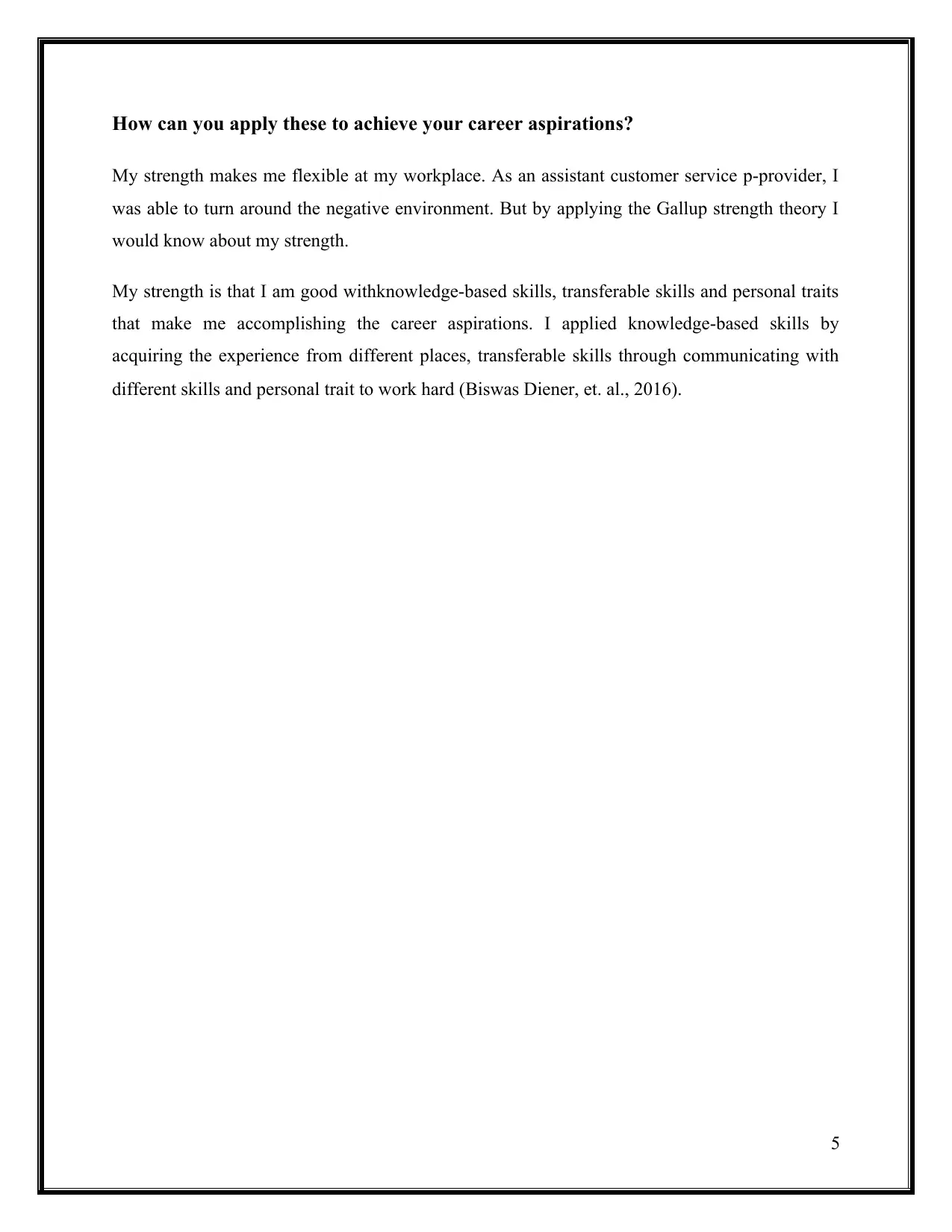
How can you apply these to achieve your career aspirations?
My strength makes me flexible at my workplace. As an assistant customer service p-provider, I
was able to turn around the negative environment. But by applying the Gallup strength theory I
would know about my strength.
My strength is that I am good withknowledge-based skills, transferable skills and personal traits
that make me accomplishing the career aspirations. I applied knowledge-based skills by
acquiring the experience from different places, transferable skills through communicating with
different skills and personal trait to work hard (Biswas‐Diener, et. al., 2016).
5
My strength makes me flexible at my workplace. As an assistant customer service p-provider, I
was able to turn around the negative environment. But by applying the Gallup strength theory I
would know about my strength.
My strength is that I am good withknowledge-based skills, transferable skills and personal traits
that make me accomplishing the career aspirations. I applied knowledge-based skills by
acquiring the experience from different places, transferable skills through communicating with
different skills and personal trait to work hard (Biswas‐Diener, et. al., 2016).
5
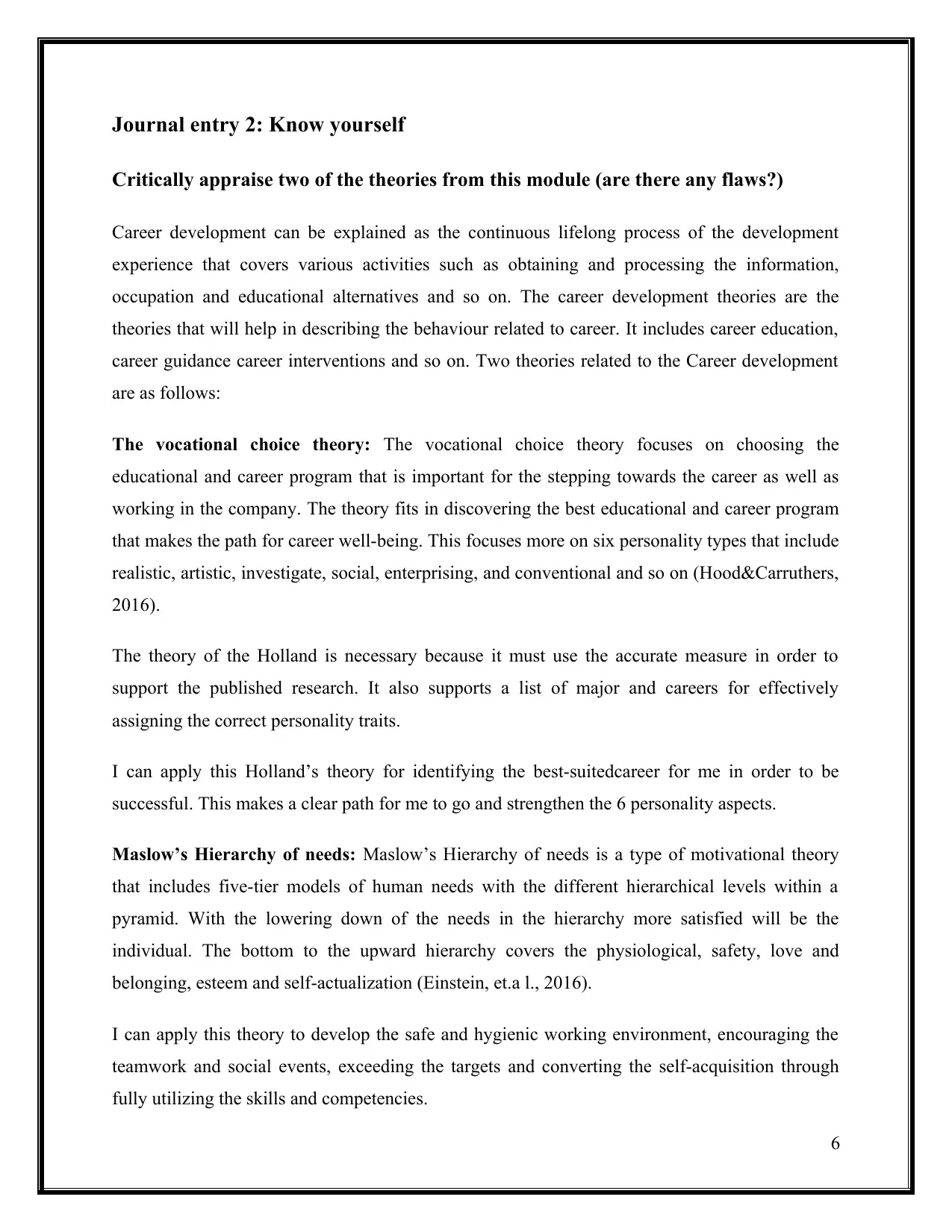
Journal entry 2: Know yourself
Critically appraise two of the theories from this module (are there any flaws?)
Career development can be explained as the continuous lifelong process of the development
experience that covers various activities such as obtaining and processing the information,
occupation and educational alternatives and so on. The career development theories are the
theories that will help in describing the behaviour related to career. It includes career education,
career guidance career interventions and so on. Two theories related to the Career development
are as follows:
The vocational choice theory: The vocational choice theory focuses on choosing the
educational and career program that is important for the stepping towards the career as well as
working in the company. The theory fits in discovering the best educational and career program
that makes the path for career well-being. This focuses more on six personality types that include
realistic, artistic, investigate, social, enterprising, and conventional and so on (Hood&Carruthers,
2016).
The theory of the Holland is necessary because it must use the accurate measure in order to
support the published research. It also supports a list of major and careers for effectively
assigning the correct personality traits.
I can apply this Holland’s theory for identifying the best-suitedcareer for me in order to be
successful. This makes a clear path for me to go and strengthen the 6 personality aspects.
Maslow’s Hierarchy of needs: Maslow’s Hierarchy of needs is a type of motivational theory
that includes five-tier models of human needs with the different hierarchical levels within a
pyramid. With the lowering down of the needs in the hierarchy more satisfied will be the
individual. The bottom to the upward hierarchy covers the physiological, safety, love and
belonging, esteem and self-actualization (Einstein, et.a l., 2016).
I can apply this theory to develop the safe and hygienic working environment, encouraging the
teamwork and social events, exceeding the targets and converting the self-acquisition through
fully utilizing the skills and competencies.
6
Critically appraise two of the theories from this module (are there any flaws?)
Career development can be explained as the continuous lifelong process of the development
experience that covers various activities such as obtaining and processing the information,
occupation and educational alternatives and so on. The career development theories are the
theories that will help in describing the behaviour related to career. It includes career education,
career guidance career interventions and so on. Two theories related to the Career development
are as follows:
The vocational choice theory: The vocational choice theory focuses on choosing the
educational and career program that is important for the stepping towards the career as well as
working in the company. The theory fits in discovering the best educational and career program
that makes the path for career well-being. This focuses more on six personality types that include
realistic, artistic, investigate, social, enterprising, and conventional and so on (Hood&Carruthers,
2016).
The theory of the Holland is necessary because it must use the accurate measure in order to
support the published research. It also supports a list of major and careers for effectively
assigning the correct personality traits.
I can apply this Holland’s theory for identifying the best-suitedcareer for me in order to be
successful. This makes a clear path for me to go and strengthen the 6 personality aspects.
Maslow’s Hierarchy of needs: Maslow’s Hierarchy of needs is a type of motivational theory
that includes five-tier models of human needs with the different hierarchical levels within a
pyramid. With the lowering down of the needs in the hierarchy more satisfied will be the
individual. The bottom to the upward hierarchy covers the physiological, safety, love and
belonging, esteem and self-actualization (Einstein, et.a l., 2016).
I can apply this theory to develop the safe and hygienic working environment, encouraging the
teamwork and social events, exceeding the targets and converting the self-acquisition through
fully utilizing the skills and competencies.
6
⊘ This is a preview!⊘
Do you want full access?
Subscribe today to unlock all pages.

Trusted by 1+ million students worldwide
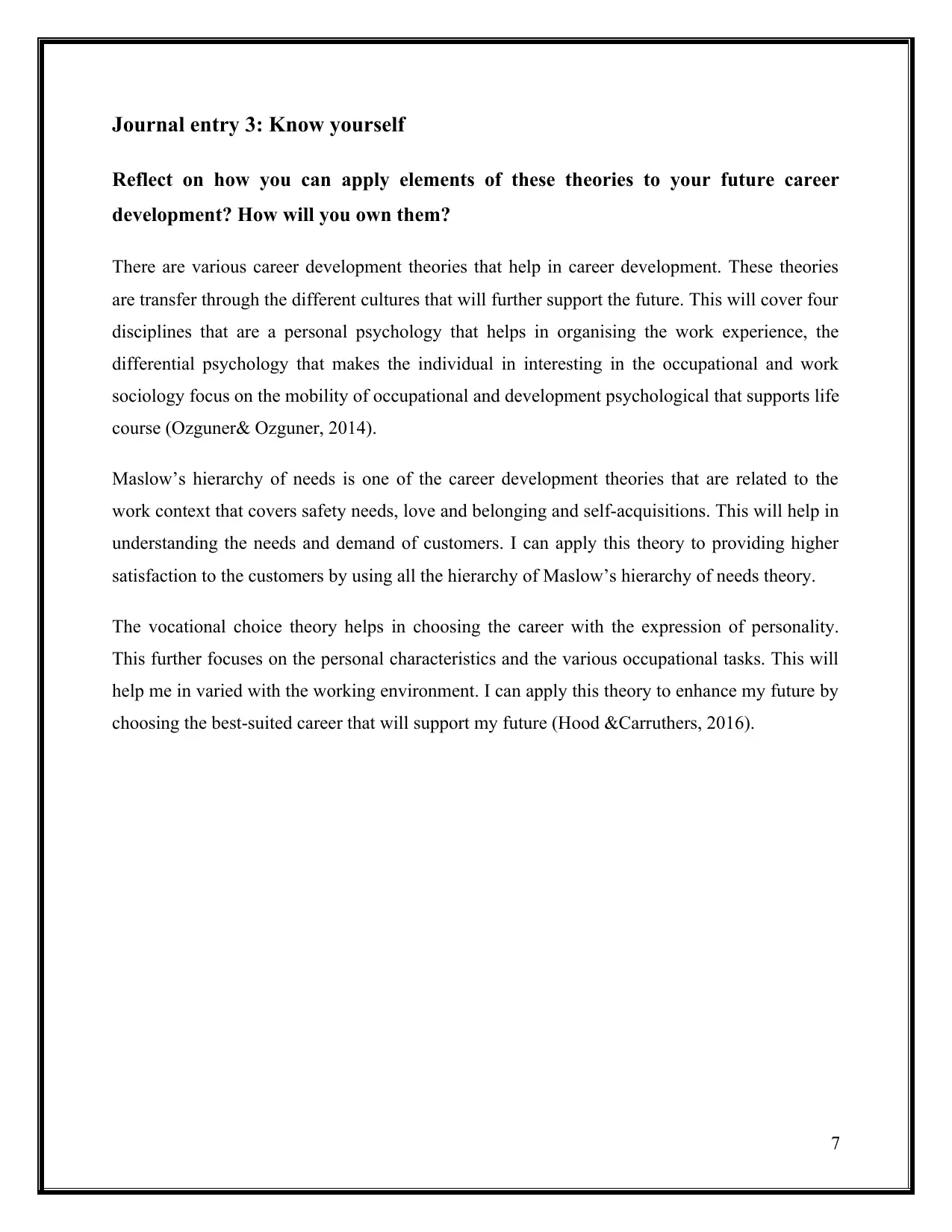
Journal entry 3: Know yourself
Reflect on how you can apply elements of these theories to your future career
development? How will you own them?
There are various career development theories that help in career development. These theories
are transfer through the different cultures that will further support the future. This will cover four
disciplines that are a personal psychology that helps in organising the work experience, the
differential psychology that makes the individual in interesting in the occupational and work
sociology focus on the mobility of occupational and development psychological that supports life
course (Ozguner& Ozguner, 2014).
Maslow’s hierarchy of needs is one of the career development theories that are related to the
work context that covers safety needs, love and belonging and self-acquisitions. This will help in
understanding the needs and demand of customers. I can apply this theory to providing higher
satisfaction to the customers by using all the hierarchy of Maslow’s hierarchy of needs theory.
The vocational choice theory helps in choosing the career with the expression of personality.
This further focuses on the personal characteristics and the various occupational tasks. This will
help me in varied with the working environment. I can apply this theory to enhance my future by
choosing the best-suited career that will support my future (Hood &Carruthers, 2016).
7
Reflect on how you can apply elements of these theories to your future career
development? How will you own them?
There are various career development theories that help in career development. These theories
are transfer through the different cultures that will further support the future. This will cover four
disciplines that are a personal psychology that helps in organising the work experience, the
differential psychology that makes the individual in interesting in the occupational and work
sociology focus on the mobility of occupational and development psychological that supports life
course (Ozguner& Ozguner, 2014).
Maslow’s hierarchy of needs is one of the career development theories that are related to the
work context that covers safety needs, love and belonging and self-acquisitions. This will help in
understanding the needs and demand of customers. I can apply this theory to providing higher
satisfaction to the customers by using all the hierarchy of Maslow’s hierarchy of needs theory.
The vocational choice theory helps in choosing the career with the expression of personality.
This further focuses on the personal characteristics and the various occupational tasks. This will
help me in varied with the working environment. I can apply this theory to enhance my future by
choosing the best-suited career that will support my future (Hood &Carruthers, 2016).
7
Paraphrase This Document
Need a fresh take? Get an instant paraphrase of this document with our AI Paraphraser
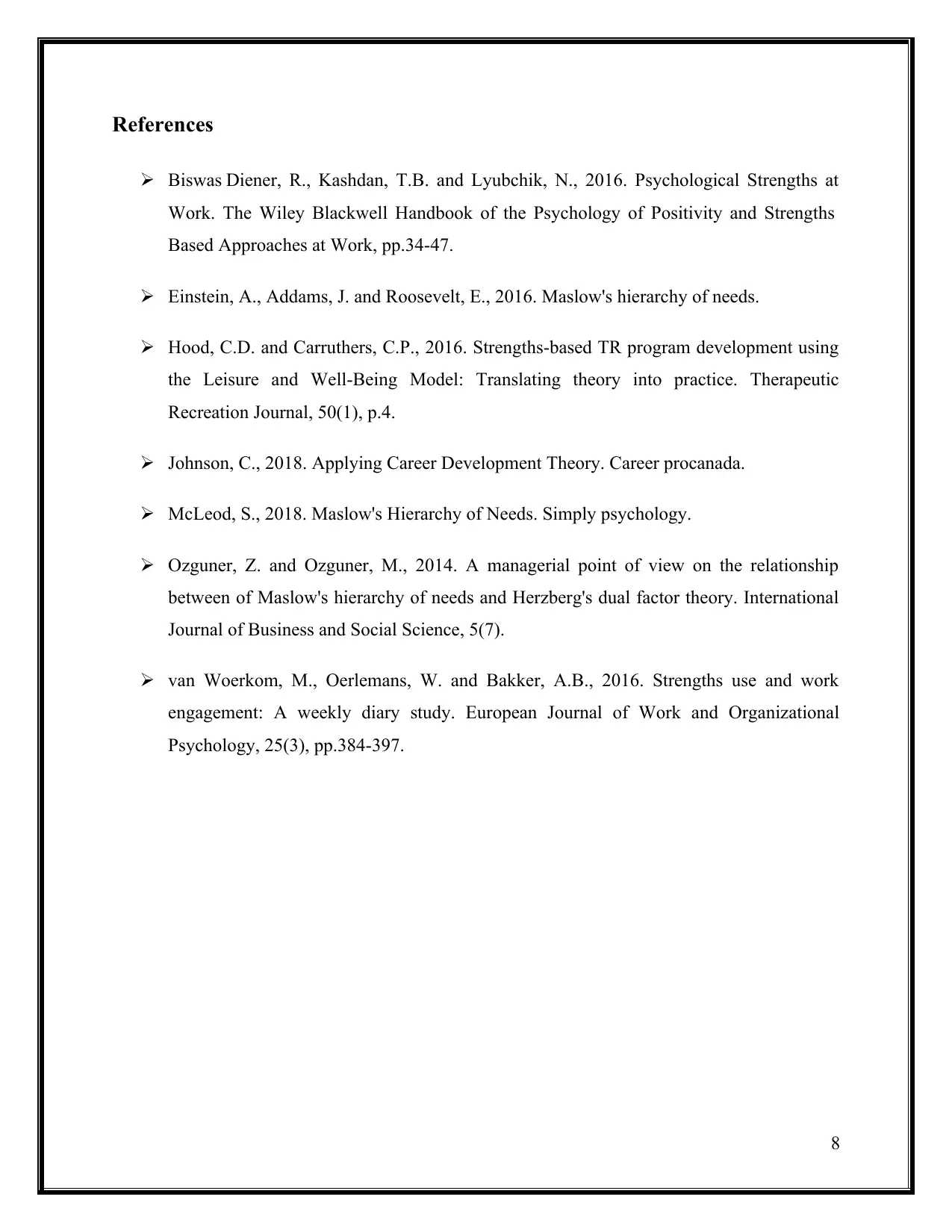
References
Biswas‐Diener, R., Kashdan, T.B. and Lyubchik, N., 2016. Psychological Strengths at
Work. The Wiley Blackwell Handbook of the Psychology of Positivity and Strengths‐
Based Approaches at Work, pp.34-47.
Einstein, A., Addams, J. and Roosevelt, E., 2016. Maslow's hierarchy of needs.
Hood, C.D. and Carruthers, C.P., 2016. Strengths-based TR program development using
the Leisure and Well-Being Model: Translating theory into practice. Therapeutic
Recreation Journal, 50(1), p.4.
Johnson, C., 2018. Applying Career Development Theory. Career procanada.
McLeod, S., 2018. Maslow's Hierarchy of Needs. Simply psychology.
Ozguner, Z. and Ozguner, M., 2014. A managerial point of view on the relationship
between of Maslow's hierarchy of needs and Herzberg's dual factor theory. International
Journal of Business and Social Science, 5(7).
van Woerkom, M., Oerlemans, W. and Bakker, A.B., 2016. Strengths use and work
engagement: A weekly diary study. European Journal of Work and Organizational
Psychology, 25(3), pp.384-397.
8
Biswas‐Diener, R., Kashdan, T.B. and Lyubchik, N., 2016. Psychological Strengths at
Work. The Wiley Blackwell Handbook of the Psychology of Positivity and Strengths‐
Based Approaches at Work, pp.34-47.
Einstein, A., Addams, J. and Roosevelt, E., 2016. Maslow's hierarchy of needs.
Hood, C.D. and Carruthers, C.P., 2016. Strengths-based TR program development using
the Leisure and Well-Being Model: Translating theory into practice. Therapeutic
Recreation Journal, 50(1), p.4.
Johnson, C., 2018. Applying Career Development Theory. Career procanada.
McLeod, S., 2018. Maslow's Hierarchy of Needs. Simply psychology.
Ozguner, Z. and Ozguner, M., 2014. A managerial point of view on the relationship
between of Maslow's hierarchy of needs and Herzberg's dual factor theory. International
Journal of Business and Social Science, 5(7).
van Woerkom, M., Oerlemans, W. and Bakker, A.B., 2016. Strengths use and work
engagement: A weekly diary study. European Journal of Work and Organizational
Psychology, 25(3), pp.384-397.
8
1 out of 8
Related Documents
Your All-in-One AI-Powered Toolkit for Academic Success.
+13062052269
info@desklib.com
Available 24*7 on WhatsApp / Email
![[object Object]](/_next/static/media/star-bottom.7253800d.svg)
Unlock your academic potential
Copyright © 2020–2026 A2Z Services. All Rights Reserved. Developed and managed by ZUCOL.





